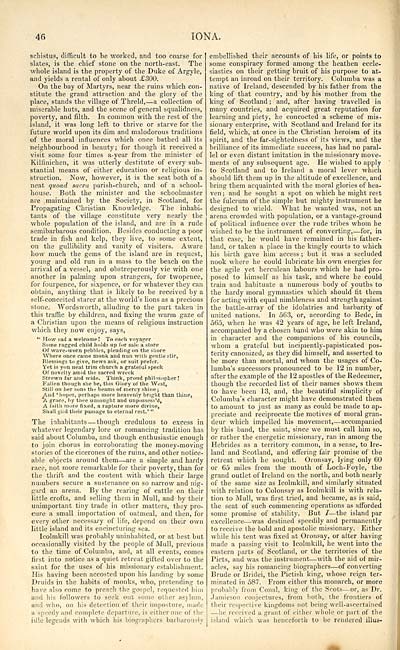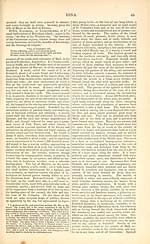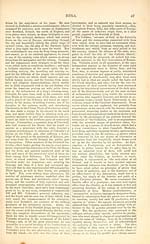Download files
Complete book:
Individual page:
Thumbnail gallery: Grid view | List view

46
IONA.
schistus, difficult to be worked, and too coarse for
slates, is the chief stone on the north-east. The
whole island is the property of the Duke of Argyle,
and yields a rental of only about £300.
On the bay of Martyrs, near the ruins which con-
stitute the grand attraction and the glory of the
place, stands the village of Threld, — a collection of
miserable huts, and the scene of general squalidness,
poverty, and filth. In common with the rest of the
island, it was long left to thrive or starve for the
future world upon its dim and malodorous traditions
of the moral influences which once bathed all its
neighbourhood in beauty ; for though it received a
visit some four times a-year from the minister of
Kihinichen, it was utterly destitute of every sub-
stantial means of either education or religious in-
struction. Now, however, it is the seat both of a
neat quoad sacra parish-church, and of a school-
house. Both the minister and the schoolmaster
are maintained by the Society, in Scotland, for
Propagating Christian Knowledge. The inhabi-
tants of the village constitute very nearly the
whole population of the island, and are in a rude
semibarbarous condition. Besides conducting a poor
trade in fish and kelp, they live, to some extent,
on the gullibility and vanity of visiters. Aware
how much the gems of the island are in request,
young and old run in a mass to the beach on the
arrival of a vessel, and obstreperously vie with one
another in palming upon strangers, for twopence,
for fourpence, for sixpence, or for whatever they can
obtain, anything that is likely to be received by a
self-conceited starer at the world's lions as a precious
stone. Wordsworth, alluding to the part taken in
this traffic by children, and fixing the warm gaze of
a Christian upon the means of religious instruction
which they now enjoy, says,
" How sad a welcome! To each voyager
Some ragged child holds up for sale a store
Of wave-worn pebbles, pleading on the shore
Where once came monk and nun with gentle stir,
Blessings to give, news ask, or suit prefer.
Yet is yon neat trim church a grateful speck
Of novelty amid the sacred wreck
Strewn far and wide. Think, proud philosopher!
Fallen though she be, this Glory of the West,
Still on her sons the beams of mercy shine ;
And 'hopes, perhaps more heavenly bright than thine,
*A grace, by thee unsought and unpossess'd,
A faith more fixed, a rapture more divine,
Shall gild their passage to eternal rest.' "
The inhabitants — though credulous to excess in
whatever legendary lore or romancing tradition has
said about Columba, and though enthusiastic enough
to join chorus in corroborating the money-moving
stories of the cicerones of the ruins, and other notice-
able objects around them — are a simple and hardy
race, not more remarkable for their poverty, than for
the thrift and the content with which their large
numbers secure a sustenance on so narrow and nig-
gard an arena. By the rearing of cattle on their
little crofts, and selling them in Mull, and by their
unimportant tiny trade in other matters, they pro-
cure a small importation of oatmeal, and then, for
every other necessary of life, depend on their own
little island and its encincturing sea.
Icolmkill was probably uninhabited, or at best but
occasionally visited by the people of Mull, previous
to the time of Columba, and, at all events, comes
first into notice as a quiet retreat gifted over to the
saint for the uses of his missionary establishment.
His having been accosted upon his landing by some
Druids in the habits of monks, who, pretending to
have also come to preach the gospel, requested him
and his followers to seek out some other asylum,
and who, on his detection of their imposture, made
a speedy and complete departure, is either one of the
idle legends with which his biographers barbarously
embellished their accounts of his life, or points to
some conspiracy formed among the heathen eccle-
siastics on their getting bruit of his purpose to at-
tempt an inroad on their territory. Columba was a
native of Ireland, descended by his father from the
king of that country, and by his mother from the
king of Scotland ; and, after having travelled in
many countries, and acquired great reputation for
learning and piety, he concocted a scheme of mis-
sionary enterprise, with Scotland and Ireland for its
field, which, at once in the Christian heroism of its
spirit, and the far-sightedness of its views, and the
brilliance of its immediate success, has had no paral-
lel or even distant imitation in the missionary move-
ments of any subsequent age. He wished to apply
to Scotland and to Ireland a moral lever which
should lift them up in the altitude of excellence, and
bring them acquainted with the moral glories of hea-
ven ; and he sought a spot on which he might rest
the fulcrum of the simple but mighty instrument he
designed to wield. What he wanted was, not an
arena crowded with population, or a vantage-ground
of political influence over the rude tribes whom he
wished to be the instrument of converting, — for, in
that ease, he would have remained in his father-
land, or taken a place in the kingly courts to which
his birth gave him access ; but it was a secluded
nook where he could lubricate his own energies for
the agile yet herculean labours which he had pro-
posed to himself as his task, and where he could
train and habituate a numerous body of youths to
the hardy moral gymnastics which should fit them
for acting with equal nimbleness and strength against
the battle-array of the idolatries and barbarity of
united nations. In 563, or, according to Bede, in
565, when he was 42 years of age, he left Ireland,
accompanied by a chosen band who were akin to him
in character and the companions of his councils,
whom a grateful but incipiently-papisticated pos-
terity canonized, as they did himself, and asserted to
be more than mortal, and whom the usages of Co-
lumba's successors pronounced to be 12 in number,
after the example of the 12 apostles of the Redeemer,
though the recorded list of their names shows thein
to have been 13, and, the beautiful simplicity of
Columba's character might have demonstrated them
to amount to just as many as could be made to ap-
preciate and reciprocate the motives of moral gran-
deur which impelled his movement, — accompanied
by this band, the saint, since we must call him so,
or rather the energetic missionary, ran in among the
Hebrides as a territory common, in a sense, to Ire-
land and Scotland, and offering fair promise of the
retreat which he sought. Oronsay, lying only 60
or 65 miles from the mouth of Loch-Foyle, the
grand outlet of Ireland on the north, and both nearly
of the same size as Icolmkill, and similarly situated
with relation to Colonsay as Icolmkill is with rela-
tion to Mull, was first tried, and became, as is said,
the seat of such commencing operations as afforded
some promise of stability. But /—the island par
excellence. — was destined speedily and permanently
to receive the bold and apostolic missionary. Either
while his tent was fixed at Oronsay, or alter having
made a passing visit to Icolmkill, he went into the
eastern parts of Scotland, or the territories of the
Picts, and was the instrument: — with the aid of mir-
acles, say his romancing biographers — of converting
Brude or Bridei, the Pictish king, whose reign ter-
minated in 587. From either this monarch, or more
probably from Conal, king of the Scots — or, as Dr.
Jamieson conjectures, from both, the frontiers of
their, respective kingdoms not being well-ascertained
— he received a grant of either whole or part of the
island which was henceforth to be rendered illus-
IONA.
schistus, difficult to be worked, and too coarse for
slates, is the chief stone on the north-east. The
whole island is the property of the Duke of Argyle,
and yields a rental of only about £300.
On the bay of Martyrs, near the ruins which con-
stitute the grand attraction and the glory of the
place, stands the village of Threld, — a collection of
miserable huts, and the scene of general squalidness,
poverty, and filth. In common with the rest of the
island, it was long left to thrive or starve for the
future world upon its dim and malodorous traditions
of the moral influences which once bathed all its
neighbourhood in beauty ; for though it received a
visit some four times a-year from the minister of
Kihinichen, it was utterly destitute of every sub-
stantial means of either education or religious in-
struction. Now, however, it is the seat both of a
neat quoad sacra parish-church, and of a school-
house. Both the minister and the schoolmaster
are maintained by the Society, in Scotland, for
Propagating Christian Knowledge. The inhabi-
tants of the village constitute very nearly the
whole population of the island, and are in a rude
semibarbarous condition. Besides conducting a poor
trade in fish and kelp, they live, to some extent,
on the gullibility and vanity of visiters. Aware
how much the gems of the island are in request,
young and old run in a mass to the beach on the
arrival of a vessel, and obstreperously vie with one
another in palming upon strangers, for twopence,
for fourpence, for sixpence, or for whatever they can
obtain, anything that is likely to be received by a
self-conceited starer at the world's lions as a precious
stone. Wordsworth, alluding to the part taken in
this traffic by children, and fixing the warm gaze of
a Christian upon the means of religious instruction
which they now enjoy, says,
" How sad a welcome! To each voyager
Some ragged child holds up for sale a store
Of wave-worn pebbles, pleading on the shore
Where once came monk and nun with gentle stir,
Blessings to give, news ask, or suit prefer.
Yet is yon neat trim church a grateful speck
Of novelty amid the sacred wreck
Strewn far and wide. Think, proud philosopher!
Fallen though she be, this Glory of the West,
Still on her sons the beams of mercy shine ;
And 'hopes, perhaps more heavenly bright than thine,
*A grace, by thee unsought and unpossess'd,
A faith more fixed, a rapture more divine,
Shall gild their passage to eternal rest.' "
The inhabitants — though credulous to excess in
whatever legendary lore or romancing tradition has
said about Columba, and though enthusiastic enough
to join chorus in corroborating the money-moving
stories of the cicerones of the ruins, and other notice-
able objects around them — are a simple and hardy
race, not more remarkable for their poverty, than for
the thrift and the content with which their large
numbers secure a sustenance on so narrow and nig-
gard an arena. By the rearing of cattle on their
little crofts, and selling them in Mull, and by their
unimportant tiny trade in other matters, they pro-
cure a small importation of oatmeal, and then, for
every other necessary of life, depend on their own
little island and its encincturing sea.
Icolmkill was probably uninhabited, or at best but
occasionally visited by the people of Mull, previous
to the time of Columba, and, at all events, comes
first into notice as a quiet retreat gifted over to the
saint for the uses of his missionary establishment.
His having been accosted upon his landing by some
Druids in the habits of monks, who, pretending to
have also come to preach the gospel, requested him
and his followers to seek out some other asylum,
and who, on his detection of their imposture, made
a speedy and complete departure, is either one of the
idle legends with which his biographers barbarously
embellished their accounts of his life, or points to
some conspiracy formed among the heathen eccle-
siastics on their getting bruit of his purpose to at-
tempt an inroad on their territory. Columba was a
native of Ireland, descended by his father from the
king of that country, and by his mother from the
king of Scotland ; and, after having travelled in
many countries, and acquired great reputation for
learning and piety, he concocted a scheme of mis-
sionary enterprise, with Scotland and Ireland for its
field, which, at once in the Christian heroism of its
spirit, and the far-sightedness of its views, and the
brilliance of its immediate success, has had no paral-
lel or even distant imitation in the missionary move-
ments of any subsequent age. He wished to apply
to Scotland and to Ireland a moral lever which
should lift them up in the altitude of excellence, and
bring them acquainted with the moral glories of hea-
ven ; and he sought a spot on which he might rest
the fulcrum of the simple but mighty instrument he
designed to wield. What he wanted was, not an
arena crowded with population, or a vantage-ground
of political influence over the rude tribes whom he
wished to be the instrument of converting, — for, in
that ease, he would have remained in his father-
land, or taken a place in the kingly courts to which
his birth gave him access ; but it was a secluded
nook where he could lubricate his own energies for
the agile yet herculean labours which he had pro-
posed to himself as his task, and where he could
train and habituate a numerous body of youths to
the hardy moral gymnastics which should fit them
for acting with equal nimbleness and strength against
the battle-array of the idolatries and barbarity of
united nations. In 563, or, according to Bede, in
565, when he was 42 years of age, he left Ireland,
accompanied by a chosen band who were akin to him
in character and the companions of his councils,
whom a grateful but incipiently-papisticated pos-
terity canonized, as they did himself, and asserted to
be more than mortal, and whom the usages of Co-
lumba's successors pronounced to be 12 in number,
after the example of the 12 apostles of the Redeemer,
though the recorded list of their names shows thein
to have been 13, and, the beautiful simplicity of
Columba's character might have demonstrated them
to amount to just as many as could be made to ap-
preciate and reciprocate the motives of moral gran-
deur which impelled his movement, — accompanied
by this band, the saint, since we must call him so,
or rather the energetic missionary, ran in among the
Hebrides as a territory common, in a sense, to Ire-
land and Scotland, and offering fair promise of the
retreat which he sought. Oronsay, lying only 60
or 65 miles from the mouth of Loch-Foyle, the
grand outlet of Ireland on the north, and both nearly
of the same size as Icolmkill, and similarly situated
with relation to Colonsay as Icolmkill is with rela-
tion to Mull, was first tried, and became, as is said,
the seat of such commencing operations as afforded
some promise of stability. But /—the island par
excellence. — was destined speedily and permanently
to receive the bold and apostolic missionary. Either
while his tent was fixed at Oronsay, or alter having
made a passing visit to Icolmkill, he went into the
eastern parts of Scotland, or the territories of the
Picts, and was the instrument: — with the aid of mir-
acles, say his romancing biographers — of converting
Brude or Bridei, the Pictish king, whose reign ter-
minated in 587. From either this monarch, or more
probably from Conal, king of the Scots — or, as Dr.
Jamieson conjectures, from both, the frontiers of
their, respective kingdoms not being well-ascertained
— he received a grant of either whole or part of the
island which was henceforth to be rendered illus-
Set display mode to: Large image | Transcription
Images and transcriptions on this page, including medium image downloads, may be used under the Creative Commons Attribution 4.0 International Licence unless otherwise stated. ![]()
| Gazetteers of Scotland, 1803-1901 > Topographical, statistical, and historical gazetteer of Scotland > Volume 2 > (56) Page 46 |
|---|
| Permanent URL | https://digital.nls.uk/97449262 |
|---|
| Description | Volume second: I-Z. |
|---|---|
| Shelfmark | Map Room Ref.2 |
| Attribution and copyright: |
|

